by Heather Kent | Jul 30, 2015
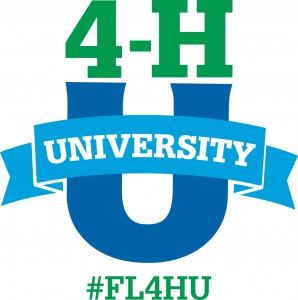 4-H University will be streaming live for your viewing pleasure at http://florida4h.org/live/:
4-H University will be streaming live for your viewing pleasure at http://florida4h.org/live/:
Tune in to see the impact UF IFAS Extension 4-H has on Florida’s youth. Don’t miss the awards banquet tonight at 6PM Eastern/5PM Central. During tonight’s program, you can see 4-Hers accept scholarships, watch the newly elected state officers inducted, and also see distinguished 4-H volunteers and stakeholders inducted into the Florida 4-H Hall of Fame! Two volunteers from the Florida Panhandle will be inducted tonight- Barry Hoffman from Leon County 4-H and Terry Stout from Okaloosa County 4-H. Both men have been volunteers at the club, county, district and state levels. They serve on both the Area A Horse Advisory Committee and the State 4-H Horse Advisory Committee and have supported the Florida 4-H Program for more than 20 years!
by Julie Pigott Dillard | Jul 24, 2015
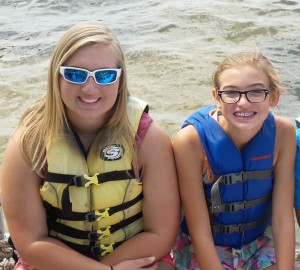
Do you know how to properly fit a life jacket? Photo credit Washington County Extension.
Like Dr. Seuss said, “It’s fun to have fun, but you have to know how.” With over 11,000 miles of rivers, streams and waterways, 4,136 miles of beaches, coastlines, and shorelines, and 4,308 square miles of total water area, Floridians can enjoy time on the water year-round. Whether you’re out cruising the river, fishing for Red Snapper in the gulf or wakeboarding on a spring-fed lake, you should be thinking about water safety.
The number one rule in boating and water sports safety is to wear a life jacket. According to safetykids.org, 77% of fatal boating accidents were drowning victims, and 84% of those victims weren’t wearing life jackets. Florida law states that all children six years of age and under must wear a life jacket, but all youth can benefit from wearing a properly sized, snug fitting U.S. Coast Guard approved life jacket to ensure safety in and around water and while boating.
You might think that life jackets are useful only in rough conditions, but one-half of all water related fatalities happen in calm waters. So, when would a life jacket save lives?
- When a boat has capsized in rough water.
- When a boat sinks in heavy sea conditions.
- When a person is thrown from a boat after a collision.
- When an injury occurs.
- When a person is tossed into freezing water.
- When a person is thrown off balance and into the water fishing.
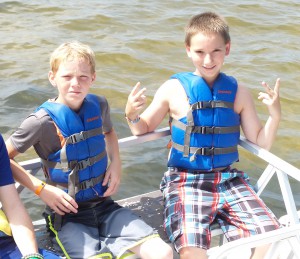
According to Florida law, youth ages 6 and under must wear a life jacket, but everyone can benefit from wearing one. Photo credit Washington County Extension.
- When a carbon monoxide fumes cause unconsciousness.
- When a person is unable to swim because of heavy, waterlogged clothing.
To ensure you have a properly fitting life jacket:
- Choose a life jacket for your size and weight.
- Correctly fasten all straps and buckles.
- Hold your arms up in the touchdown pose.
- Ask someone to gently pull up on the tops of the arm openings.
- Check there is no excess room above the arm opening and to make sure the jacket doesn’t ride up over your chin or face.
Remember, fun items like pool noodles, floats and water wings should never be substituted for a well-fitting life jacket. Consider a life jacket like any other piece of sporting equipment that requires maintenance. Check it yearly for wear and tear and for buoyancy, and throw away leaky, faded, waterlogged and misshapen life jackets. Football players wear helmets, drivers and car riders wear seat belts – responsible boaters should wear life jackets.
If you have a passion for fishing or boating, consider becoming a 4-H Sports fishing project leader. We have some wonderful curriculum and resources for volunteers who would like to share their fishing expertise with youth. To find out more, contact your local UF IFAS Extension Office, or visit http://florida4h.org/volunteers.
Your opinion matters! Take this short survey to help us improve our blog: https://ufl.qualtrics.com/SE/?SID=SV_3gtLKjqia3F75QN
by Heather Kent | Jul 21, 2015

4-H Day at LEGOLAND is Saturday, September 26th. Be sure to wear your 4-H shirt and share photos #4heverywhere
The 3nd Annual 4-H Day at LEGOLAND on Saturday, September 26th. This event is an opportunity for 4-H members and their families to explore the LEGOLAND theme park at a deep discount, while raising funds for 4-H clubs, camps, and other educational programs. LEGOLAND is a great way to have fun with the entire family and learn about science, engineering, and technology. The Florida Department of Ag’s greenhouse is a must-see attraction. You can learn all about Florida agriculture and how we are feeding the nation and world. Just don’t eat the produce- it’s all made from LEGOs! You can also sign up for a robotics class while you are there to learn how engineers design, build, program, and test
robots.
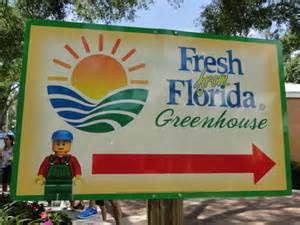
The Florida Department of Agriculture Greenhouse is a must-see attraction at LEGOLAND.
Frequently Asked Questions:
Tickets are $30.00/person ($5.00 per ticket benefits the Florida 4-H Foundation)
- Any family that has participated in 4-H is eligible for the discount (this includes 4-H clubs, camps, day camps, school, afterschool, and military 4-H programs)
- Youth under the age of 3 are admitted for free
- Tickets are only good for Saturday, September 26th, 2015
- Tickets must be ordered online at least 24 hours before the event
- Use this secure link to order 4-H discount tickets- https://goo.gl/JddkeW
- You do not have to bring your 4-H Membership Card, just bring the tickets you print at home generated by the link above
- If you have a 4-H t-shirt, please wear it! We would like to see a “sea of green” at LEGOLAND that day. You can order a 4-H t-shirt at: http://florida4h.org/4-h-days/
- You are responsible for your transportation to and from the park, and for making any reservations for overnight accommodations. Many of the hotels in the area offer free shuttle services to and from the park, so ask your hotel concierge. The onsite LEGOLAND Hotel recently opened and is offering some great deals.
- If you are driving to the park, parking costs $14.00, but you can save $2.00 if you order your parking pass online http://florida.legoland.com/.
- For information about park attractions, show schedules, food, height restrictions, or accommodations for persons with disabilities visit http://florida.legoland.com/.
- Please share photos of your LEGOLAND experience on social media using #4Heverywhere
by Stefanie Prevatt | Jul 17, 2015
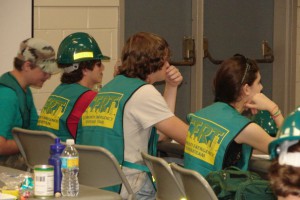
4-H Teens learn how to respond to emergencies as well as careers related to emergency management and safety through the CERT program. Leon County Extension photo.
It’s mid-summertime. Tourists are flocking to beaches like seagulls to bread. Summer camps and in full swing and so are daily afternoon thunderstorms. In Florida, torrential rain, lightening, and thunderstorms are so common place they often aren’t treated with due respect. However, one group of 4-H teens and adult volunteers in Leon County have been working with disaster preparedness for six years and understands just how quickly Mother Nature can turn from beautiful to dangerous.
The Teen Community Emergency Response Team (CERT) is a unique organization that teaches participants leadership, readiness and response skills. Teens recognize hazards, man-made or natural, in order to prevent a possible disaster. Teens participating in the program are trained to safely respond to an emergency and assist victims without endangering themselves. Examples of what youth learn are:
- extinguishing small fires
- conducting light search and rescue
- setting up medical treatment areas
- assisting emergency responders
Members of the Leon County 4-H Teen CERT Club have been actively involved in natural disaster preparedness for four years. While not all members are official teen CERT members, all youth are active in learning about disasters and how to be the most prepared. Members are actively engaged in their community – passing out literature on disaster preparedness. In addition, members of 4-H Teen CERT participate in an annual first responder training exercise held at the Tallahassee Regional Airport. Our youth pose as victims of a disaster and are given the opportunity to interact with working first responders. This opportunity allows youth to interact with professionals in the field as well as understand the details that go in planning and preparing for emergency situations.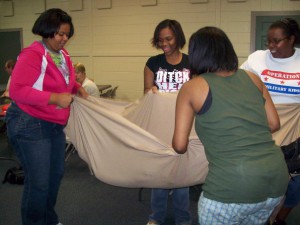
Teen CERT has been a wonderful addition to the Leon County 4-H program. Adults and youth who participate are more aware of situations that could potentially pose harm to members and bystanders. Youth are always quick to help adults remember the first aid kit and are always willing to lend and extra hand. In addition to training youth who are ready and able to respond, CERT has trained leaders who give back to their club and organization!
For more information about Teen CERT, please visit: https://www.fema.gov/community-emergency-response-teams/teen-community-emergency-response-team.
UF IFAS Disaster and Recovery information (includes a homeowner handbook and hurricane preparedness for homeowners and ag producers)
Want to help youth in your community learn how to respond to emergencies or about careers related to community safety? If you would like to start a 4-H Teen CERT club, or serve as a speaker or project leader for 4-H disaster preparedness programs, please contact your local UF IFAS Extension Office or visit http://florida4h.org/volunteers.
by Monica Brinkley | Jul 10, 2015
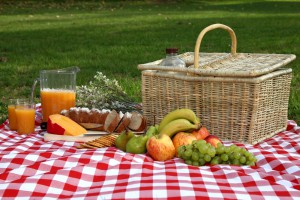
Keep your picnics safe this summer!
Summer months are a great time for picnicking with family and friends. Flies and other insects can be rather annoying, but the “bugs” you can’t see can be extremely harmful. Bacteria love the warm humid weather and grow more quickly in the summer than any other time of the year. The number of people who get sick during the hot months of the year is much greater. So read over the following tips to beat bacteria at your summer picnic.
Keep it Clean!
■ Find out if your picnic destination has a source of safe drinking water. If not, bring water or moist towelettes for cleaning hands and surfaces.
■ Always wash your hands with warm, soapy water for 20 seconds before and after handling food. Unwashed hands are a major cause of foodborne illness. Use moist towelettes if hand-washing facilities are not available.
■ Be sure raw meat and poultry are wrapped securely to prevent their juices from cross-contaminating other foods in the cooler.
■ Pack enough clean utensils for both eating and serving food. Don’t use the same utensil or platter for raw and cooked meat and poultry. Disposable plates and utensils help prevent cross-contamination.
■ Keep foods covered to prevent insects from enjoying your lunch!
Keep Cold Foods Cold!
■ Keep perishable foods cool by transporting them in an insulated cooler with plenty of ice or frozen gel packs. Perishable foods include meat, poultry, seafood, eggs, dairy products, pasta, rice, cooked vegetables, and peeled and cut fruits and vegetables.
■ Pack the cooler just before leaving home. Foods chilling in your refrigerator should be placed directly in your cooler with ice or frozen gel packs.
■ Avoid frequently opening coolers containing perishable food. It’s a good idea to store beverages and perishable foods in separate coolers.
Keep the cooler in an air-conditioned vehicle during travel and in the shade at the picnic site.
Some other resources to help or share:
UF IFAS Picnic Safety Video
UF IFAS Food Safety Factsheet for Potlucks
Fun Picnic Ideas to Try this Summer
Do you have a passion or skills that you would like to pass on to the next generation of parents, employees, civic leaders, and decision makers? 4-H needs caring adults from a wide variety of backgrounds, skills and experiences. For more information, contact your local UF IFAS Extension Office, or visit http://florida4h.org/volunteers.
Your opinion matters! Please take this short survey to help us improve our blog https://ufl.qualtrics.com/SE/?SID=SV_3gtLKjqia3F75QN
by Yolanda Goode | Jul 3, 2015
 They wiz, sparkle, pop and twirl. They thrill and sometimes scare us. Do you recall the first sparkler that you got to hold? Was it an exciting, magical experience, or did you get burned? Do you really know how hot a sparkler can get? Most children are rarely concerned with safety, It is up to the adults to keep them safe. This is especially true when it comes to fireworks. We know that as the Fourth of July is approaching, many will have their own personal fireworks show. Believe it or not, over 11,000 injuries occur each year (more than half of them happen around Forth of July celebrations).
They wiz, sparkle, pop and twirl. They thrill and sometimes scare us. Do you recall the first sparkler that you got to hold? Was it an exciting, magical experience, or did you get burned? Do you really know how hot a sparkler can get? Most children are rarely concerned with safety, It is up to the adults to keep them safe. This is especially true when it comes to fireworks. We know that as the Fourth of July is approaching, many will have their own personal fireworks show. Believe it or not, over 11,000 injuries occur each year (more than half of them happen around Forth of July celebrations).
Most cities offer a free fireworks show around this time of year. I highly recommend taking in city fireworks show and foregoing a personal one. You won’t have to worry about all the logistics of a personal fireworks display. You’ll just have to worry about getting a good viewing spot and the traffic. If you are still set on setting off fireworks, keep reading.
First of all, consider the Law. Are you able to purchase and launch fireworks in your town or city? Do you know if the fireworks you have purchased are legal in Florida? Many of the fireworks sold at road side stands are not, such as firecrackers and roman candles. Setting off illegal fireworks can result in up to a year in prison and $1,000 in fines. Second, work out safety procedures ahead of time. Carefully consider these three safety areas; personal, property, and environment.Here’s a checklist to help ensure a fun but SAFE fireworks experience for friends and family (also available as a printable PDF)
Personal Safety:
- Do you have a first aid kit on hand? Sparklers can burn up to a temperature of 2,000 thousand degrees (glass melts at only 900 degrees).
- Do you have a fire extinguisher and do you know how to use it?
- Is water available to douse dud fireworks or to put out a fire? Put another adult in charge of dousing dud fireworks and to be on “spark” lookout. Have hoses and water buckets at the ready.
- Are you familiar with the fireworks you plan to shoot? Only handle fireworks you know and heed all warnings. Leave the professional (or illegal) fireworks to the permitted professionals.
- Have you refrained from alcohol? Alcohol and the handling of fireworks is not a good mix.
- How will you ignite the fireworks to protect yourself if it goes off before it should? Make sure to not place your body over a firework when you are lighting it.
- Sometimes fireworks do not go off like they should. Leave it alone for several minutes to be sure it really is a dud. Don’t try to relight it. Douse with water before disposing of it.
- Have you communicated safety ground rules to the guests (and especially the children)?
- Stay in the clearly marked safe zone
- Adults only should handle all the fireworks
- It is not recommended that children handle fireworks. If a child is given a sparkler, he should be carefully monitored at all times.
Property Safety:
- Does the launch area have a large enough radius to prevent fireworks from landing on any structures, such as a house, garage, or vehicle?
- Have you informed your neighbors? It is courteous to inform your neighbors when you plan to host an event especially one that involves fireworks.
Environmental Safety:
- Have you checked the weather? Has it been really dry in your area? Is there a temporary ban on burning? Will it be windy?
Let not your event be the cause of the story being told about how Uncle Gump lost the tip of his finger. We also don’t want to have to replace our neighbor’s grass or garage. Keep it fun while being safe and share these tips with your friends. If you would like great information on how to photograph fireworks, see our archived article on fireworks photography by Georgene Bender.
Here are some additional links on fireworks safety that you may find helpful:
Next week, Monica Brinkley will share food safety tips for your next picnic or barbeque! Your opinion matters to us- please take this short survey to provide feedback to help us improve this blog https://ufl.qualtrics.com/SE/?SID=SV_3gtLKjqia3F75QN.
by Marcus Boston Jr. | Jun 26, 2015
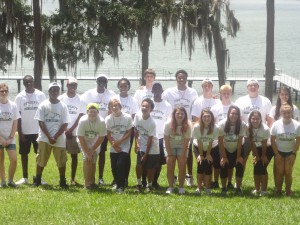 Most of us are familiar with the need for our teens to become more independent, better communicators, and to develop good decision making skills. A quick scan of the news headlines can really make one wonder about the future of our community, country, and world. This post will help relieve your anxieties! One of the ways that the Florida 4-H Program is successfully addressing this need is through our summer camp counselor program. 4-H Camp Counselors have the opportunity to learn valuable leadership skills while at the same time have a positive effect on the lives of many children. Counselors wear many hats during camp, sometimes serving in the role of a parent, role model, confidant, counselor, nurse, and mediator all in one day. The task of sharing the impact teen volunteers make as counselors was not very difficult since this is a role I have personally seen materialize while working as an 4-H extension educator. There is nothing more rewarding then to watch a child grow up starting out as a home sick camper, then developing into a confidence camper, and later becoming a responsible and dependable teen camp counselor.
Most of us are familiar with the need for our teens to become more independent, better communicators, and to develop good decision making skills. A quick scan of the news headlines can really make one wonder about the future of our community, country, and world. This post will help relieve your anxieties! One of the ways that the Florida 4-H Program is successfully addressing this need is through our summer camp counselor program. 4-H Camp Counselors have the opportunity to learn valuable leadership skills while at the same time have a positive effect on the lives of many children. Counselors wear many hats during camp, sometimes serving in the role of a parent, role model, confidant, counselor, nurse, and mediator all in one day. The task of sharing the impact teen volunteers make as counselors was not very difficult since this is a role I have personally seen materialize while working as an 4-H extension educator. There is nothing more rewarding then to watch a child grow up starting out as a home sick camper, then developing into a confidence camper, and later becoming a responsible and dependable teen camp counselor.
A recent study in Wisconsin measuring the impact of being a camp counselor resulted in the following: Teens were asked “What is unique about being a counselor?” and “What skills have you develop as a result of serving as a counselor”? The top eight skills identified included (in order of ranking) leadership, people skills, communication, patience, responsibility, teamwork, problem solving, and planning. They also reported that this experience will help them prepare for their careers because of the skills they have learned (Forsythe, Matysik, and Nelson).
An individual study done on teens that have served as camp counselors in Leon County from 2005 – 2013 showed the top skills the teens gained by serving as a camp counselor were leadership, patience, how to work with kids, and cooperation. Several teens stated that their experience has helped them to decide on what to study in college as well as what career path they would like to pursue. To bring it home and narrow the focus even more our Sr. Counselor application includes the following question: “How have you personally benefited from being a counselor?” All seven responses from our senior counselors can be summarized by the following statements:
“I’m more responsible and have made life long friendships”
“I have learned leadership skills and how to handle stressful situations”
“I’ve learned how to make campers have fun”
“It’s taught me how to communicate better and made me more outgoing”
“I was hired at my current job because I told my employee I was a camp counselor”
Research has clearly shown that the camp counselor experience provides an excellent opportunity for teens to gain leadership skills that are proven to build much needed life skills that will help them later in life. To find out more about 4-H teen leadership programs, contact your local UF IFAS Extension Office. If you have skills or experiences to share with teens to help prepare them for a future career, consider becoming a 4-H Volunteer. We offer a variety of volunteer roles based on your interests and schedule.
We hope you have enjoyed this month’s series on 4-H Summer Camp. Next week, a new series on summer safety will begin as Yolanda Goode shares firework safety tips! Your opinion matters to us- please take this short survey to provide feedback to help us improve this blog https://ufl.qualtrics.com/SE/?SID=SV_3gtLKjqia3F75QN.
by Julie Pigott Dillard | Jun 19, 2015
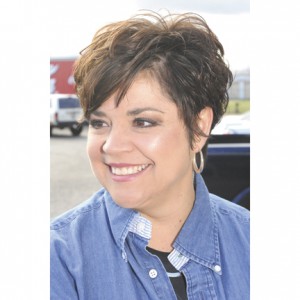
Camp would not be possible without volunteer Terre Arnold.
From scrapes and sunburns to headaches and homesickness, Terre Arnold is filling a critical role at 4-H Camp Timpoochee by keeping campers safe and healthy. During the school year, Terre works as a school health aid and a bus driver so she is a natural fit to serve as the 4-H Camp Timpoochee nurse. Terre has served as camp nurse for the Holmes/Washington/Okaloosa Counties week of 4-H residential camp for the past five years. With her warm smile, infectious laugh, caring heart and love of fun, Terre easily soothes what ails the campers, makes them comfortable and sends them on their way to have fun.
Terre describes her camping experience as a joy from year to year. With each year bringing new experiences, she loves meeting new campers and seeing returning campers grow from year to year. From the youngest camper to veteran counselors, Terre has a way with kids that makes the overall camp experience better for them. She’s also a great camp recruiter and never misses a chance to tell young kids what a great experience 4-H Camp is and how exciting and fun the week will be.
The 4-H camping program depends on volunteers like Terre. Every county is required to have a camp nurse during their week at 4-H Camp Timpoochee or Camp Cherry Lake. Typical responsibilities include curing occasional homesickness or tummy aches, or administering any prescription medications that campers may need during the week. If you have an interest in serving as a camp nurse and would like to volunteer for your local 4-H program, contact your UF IFAS County Extension Office or visit http://florida4h.org/volunteers.
by hdbignell | Jun 12, 2015
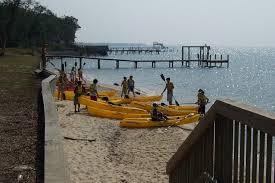
Photo credit UF IFAS Washington County
School is out and the summer is quickly approaching. As a kid, this was my favorite time of the year because in a few weeks I would be off to summer camp. I was always excited about summer camp because it was a time to make new friends while participating in my favorite outdoor activities. Going to sleep away camp gave me a sense of independence and allowed me to learn and make decisions on my own. What classes did I want to take? What activities did I want to participate in? This was something I had to decide on my own without my parents input.
4-H summer camp is the perfect opportunity to learn, make friends, disconnect from electronics, and enjoy the outdoors! Camp Cherry Lake and Camp Timpoochee give youth the opportunity to learn while having fun in a safe environment.
Preparing for camp can be physical and mental, not only on the camper, but on the parent as well. It is completely normal to be nervous before a week of sleep away camp. One of the biggest issues campers deal with is homesickness. There will be many trained adults and teen counselors who will be around the entire week of camp that will make sure that the campers are learning and having a great time, but here are some proactive things you can do with your child in preparation for camp:
- Have a sleepover at a relative’s house for the weekend.
- When physically packing, make sure your camper is involved. This can help prevent homesickness as well as making them aware of what they have with them. When packing for camp, make a list so that nothing is forgotten.
- Try avoid making deals with your child (If you are homesick, I will come pick you up early).
- The American Camping Association has some great online reources for preventing homesickness.
For more information about 4-H summer camp opportunities for youth and teen and adult volunteers, contact your local UF IFAS Extension Office.
Your opinion matters! Please provide feedback on this short survey to help us improve our blog:https://ufl.qualtrics.com/SE/?SID=SV_3gtLKjqia3F75QN.
by Jenny Savely | Jun 5, 2015
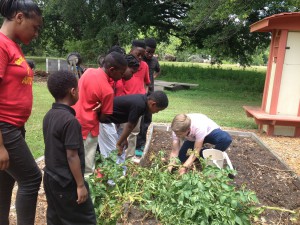
Youth learn how to grow and prepare vegetables during a gardening day camp in Escambia County.
Each summer, 4-H programs across the Florida panhandle offer a wide array of residential and day camps for youth ages 5-18. Summer residential and day camps are a great way for youth to be introduced to all that 4-H has to offer. Many camps explore specific 4-H projects, or topics, such as culinary arts, sewing, livestock or robotics, while others offer a smorgasbord of 4-H activities.
These camps differ from typical summer programs in that they are framed around the essential elements of positive youth development. 4-H is focused on developing life skills through educational programs that promote competence, confidence, connection, character, and compassion. The connection of 4-H to land grant universities like the University of Florida also means that camp curriculum is based on the best knowledge available about any given project, and taught by caring adults using learn-by-doing methods.
This summer youth are in no shortage of camps to satisfy their desire to learn while having fun. Below you can find a list of day camps that will be offered throughout the panhandle. Hurry and register your youth for the time of their life, spaces often fill quickly. Most counties also offer week long overnight camps at Camp Timpoochee or Camp Cherry Lake.
Contact the 4-H agent near you for more information and to register for any of these camps. Click on the county links below for more information. Register now and let the fun begin!
Calhoun County
July 6, 13, 20, 27 – Kids in the Kitchen, $10; Piping & Fondant Cake Decorating for Kids, $35 (or $35 for both camps)
Escambia County
June 2 – Garden to Plate Day Camp – $5, 8am-2pm (age 9-16) – Get in the kitchen with Chef David Bearl as he leads us in an interactive learning experience about cooking and activities that promote healthy lifestyles and Florida agriculture as they discuss gardening techniques and food safety.
June 17-19 – Dairy Day Camp – $5, 8am-2pm each day – Join us for three days of exploring the world of dairy. From care and biology to how to use the products of dairy cows, this camp will introduce you to the dairy industry while you make new friends and enjoy dairy related activities.
June 29 – Water Conservation Day Camp- $5, 8am-2pm – join Master Gardeners and Extension faculty in an exploration of the importance of water to our planet, how nature works to conserve it, and how we can do our part (prepare to get wet!).
July 15 – Community Awareness and Service Day Camp – $5, 8am-2pm –We will take trash items like plastic bags and jugs that you collect and reuse them to make useful items for people in need. This camp will focus on overuse and its environmental and social consequences.
July 21 – Search and Rescue Day Camp – $5, 8am – 2pm – Klaas Kids will join us for a day camp of fun and safety training. Youth will learn the process of search and rescue including how K9 units track and find lost children, and strategies youth can use for preventing crimes against them as well as what to do if they are lost in various settings.
Gadsden County
June 8 – 12 Clothing Adventures – $70, 8-5 – Youth will discover the science & technology behind fabrics, fabric care, fabric construction, and create projects.
June 15-19 Quirky Culinary Capers – $70, 8-5 – Youth will explore the magic of food science, prepare nutritious snacks, and learn how to improve their health for optimum living.
July 20-24 – It’s Alive: Junk Drawer Robotics – $70, 8-5 – Youth will engage in robotic design, use, construction, and control as they work in teams to make it come alive with everyday items. Wednesday, July 22 is challenged day in Tallahassee.
Jackson County
July 7 – Painting with a 4-H Twist Day Camp – $35, 5:00-9:00 – a local artist will walk youth step by step to the completion of a masterpiece to take home
July 20-22 – Junk Drawer Robotics – $80, 9:00 – 5:00 – learn how to make robots out of everyday household products. On the last day of camp there will be a Robotics contest with surrounding counties and will be held at the North Florida Fairground.
July 28-29 – SEW Much Fun- $45, 8:00-12:30 – designed for novice sewers with no previous experience. All materials are provided by the 4-H Department
August 6 – Cloverbud Explorations: The World of Rabbits and Poultry – $20, 8:30-11 (age 5-7) – learn how to select, properly care for, identify and enjoy a poultry or rabbit project
Jefferson County
June 22-26– Outdoor Recreation Day Camp – $35, 8:30-4:30 (age 10-15) – camp includes activities in: Forestry, Conservation, Wildlife, Archery, Air Rifles, and Sporting Clays
June 29 – July 2- Go Green in 2015 – $35, Mon. – Wed. 8-12, Thurs. 8-3 (age 5-7) – Story Time, Crafts, Fishing, Organized Recreation, Cooking, Swimming
July 8 – 12 – Go Green in 2015 – $35, Mon.-Thurs 8-4, Friday 8-12 (age 8-9) – Garden Project, Organized Recreation, Cooking, Swimming, Fishing
Leon County
June 22-26 – 4-H Wildlife camp – $80, 8-5 (age 10-18) – This outdoor nature camp will provide its participants with a basic understanding of environmental stewardship, wildlife, safety, and fun in an outdoor setting. Fun educational sessions covering National STEM (science, technology, engineering and math) initiatives will be taught by qualified instructors in aquatics, forestry, conservation, shooting sports, and orienteering.
June 30-July 2 – 4-H Outdoor cooking Camp – $80, 9-4 (age 9-13) – Youth will learn the safety and art of cooking over fire, and will go on a farm field trip.
July 13-17 – 4-H Previous Attendees Sewing Camp – $35, 8:30-12 (age 8-18) – This sewing camp is for previous 4-H sewing camp attendees or those with sewing experience. Refer to flier for required materials needed for camp.
Liberty County
June 8-11- 21st Century at W.R. Tolar School
June 15-17 – Exploring 4-H – $20, 9-4 (age 8-12) Sewing, Archery, Animals, Cooking, Bugs
June 29, July 1-3 – 21st Century at Hosford School
July 7- Rabbit Day Camp – $5, 9-4 (age 5-18)
July 20-22- Robotics Day Camp – $20, 9-4 (age 8-13)
Santa Rosa County
June 15-19 – 4-H Cooking Camp (age 8-12)- $100, 7:30-2 – Youth will learn to cook a variety of dishes and bring home a few yummy dishes! Baking, measuring, safety tips, food planning, grocery shopping, reading labels, frying, nutritional education, grilling, canning, bread-making and more will be on the agenda.
June 22-26 – Discovering 4-H Day Camp – $100, 7:30-4 – These days will expose youth all the projects Santa Rosa County 4-H has to offer. Monday: Trip to Bear Lake for wildlife and natural resources hike. Tuesday: Farm tour. Wednesday: Navarre Marine Ecology and Butterfly house. Thursday: Archery and garden tour. Friday: Nutrition, peanuts, beekeeping.
Wakulla County
June 15-17 – 4-H Sewing and Crafts Camp – $35, 8:30-4:30 – “learning sewing and artistic crafts, one stich at a time.” The camp will focus on basic sewing and crafting skills.
June 24-26 – 4-H Cooking Day Camp – $35, 8:30-4:30 – “a chef in the garden, a scientist in the kitchen.” The campers will learn how to cook simple, healthy, meals, while exploring where food comes from, and how, scientifically, it can be transformed into delicious meals through cooking.
Walton County
June 11 – Silly Science Cloverbuds (age 5-7) – $15, 8:30-12:30 – will feature fun science experiments
June 15-18 – 4-H Growing Roots – $30, 8:30-4:00 – feature a little bit of everything, like health & fitness, finances, Agriculture, beekeeping
July 13-16 – Seaside Robotics – $40, 8:30-4:00 – features not only assembly but programming
July 20-23 – X-Treme Cuisine – $30, 8:30-4:00 – will teach healthy snack and meal preparation, cooking, and basic kitchen safety
 4-H University will be streaming live for your viewing pleasure at http://florida4h.org/live/:
4-H University will be streaming live for your viewing pleasure at http://florida4h.org/live/:











